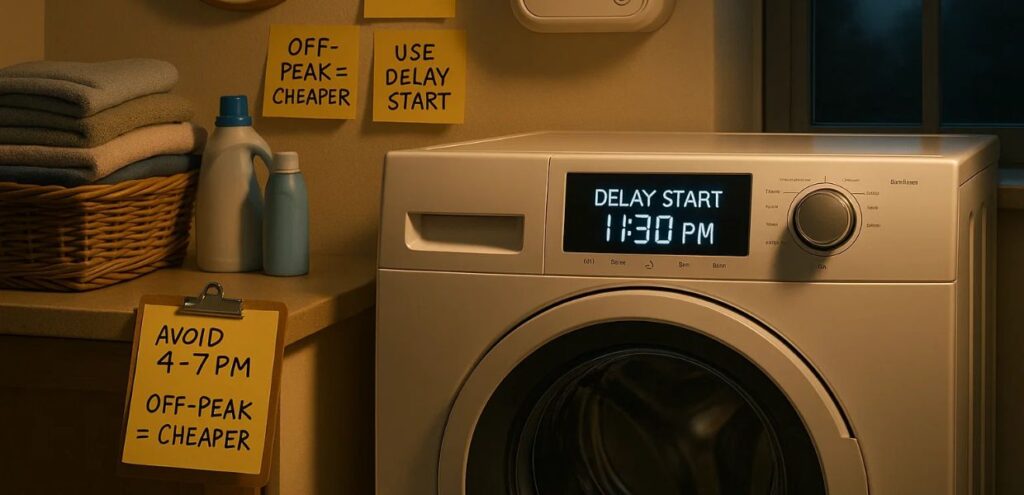
Energy costs across the U.S. are a growing concern for many households. While prices have fluctuated in recent years, utility bills remain higher than pre-energy crisis levels. The average American household spends over $2,000 annually on energy, making it essential to find ways to cut back. One appliance that often slips under the radar is the washing machine.
It’s among the biggest energy users at home, requiring around 50 gallons of water per load and consuming significant electricity, especially when heating water. By learning the best time to wash clothes and making a few simple adjustments, you can lower your monthly bills without sacrificing fresh, clean laundry.
How Laundry Times Can Save You Money

Not all washing times are equal. Electricity costs can vary dramatically depending on the time of day because of how demand works. During peak hours, when people are cooking, heating, watching TV, and running appliances all at once, prices tend to be higher. Most utility providers set their peak periods between 4 pm and 7 pm.
Shifting your laundry outside these windows can save you money and reduce pressure on the energy grid. It’s a win-win, lower costs for you, and a more balanced energy system for everyone. Planning your laundry schedule can also help extend the life of your appliances since they aren’t being overworked during high-demand periods. Over time, these savings can add up to make a noticeable difference in your household budget.
Why laundry timing matters:
- Peak hours (4–7 pm) = highest energy demand and cost.
- Off-peak hours (late evenings or early mornings) = cheaper energy rates.
- Smart meters and time-of-use tariffs allow households to take full advantage of these differences.
- Using a washing machine’s delay start feature means you don’t even need to be home to benefit.
By simply adjusting when you press “start,” you’re already taking a big step toward lowering your bills and using energy more efficiently.
The Best Time of Day to Wash Clothes
Experts agree that the best time to wash clothes depends on the season and how energy demand shifts throughout the year. Choosing the right time can make each cycle significantly cheaper.
Summer: Early mornings, ideally before 9 am, are the sweet spot. Cooler air and reduced energy demand make it cost-efficient.
Winter: Evenings after 8 pm are more affordable because mornings see high demand from heating systems.
Weekends & Holidays: Generally cheaper than weekdays, as industrial and office energy usage is lower.
If you have a smart meter, you can also benefit from time-of-use (TOU) tariffs, which charge less during off-peak hours. Many modern machines allow you to schedule cycles overnight, making it easy to save without lifting a finger. Even shifting just a few loads per week to off-peak times can reduce monthly utility bills. According to the U.S. Department of Energy, adjusting energy use habits like laundry timing is one of the simplest ways households can cut costs and reduce pressure on the power grid.
Additional Ways to Save on Laundry Costs

Changing your laundry time is just one piece of the puzzle. Small adjustments in how you use your washing machine can multiply your savings and extend the life of your clothes.
Practical strategies for cutting laundry bills:
- Cold washes: Heating water accounts for about 90% of washing energy use. Cold or 30°C washes are cheaper and gentler on fabrics.
- Air-dry whenever possible: Tumble dryers are electricity guzzlers. Sunlight and fresh air not only save money but also freshen clothes naturally.
- Run full loads: Maximise efficiency by combining laundry. Several small loads waste water and electricity.
- High spin settings: Spin cycles remove more water, cutting drying times and energy use.
- Regular maintenance: Clean lint traps, check hoses, and service your machine every six months to keep it running efficiently.
Why Peak and Off-Peak Laundry Makes a Difference

It’s easy to assume your washing machine costs the same to run no matter when you use it, but that’s not the case. Energy providers calculate prices based on demand, which shifts throughout the day. During peak hours, when millions of households are cooking, heating, or using multiple appliances at once, demand on the grid surges, pushing costs higher. Off-peak hours, on the other hand, are designed to balance the load, which is why providers often offer cheaper tariffs at those times.
Think of it this way: running a wash at 6 pm might cost nearly double compared to the same load at 9 am in summer or 9 pm in winter. While the difference may only seem like a few cents per cycle, those small amounts accumulate quickly. Over a year, this could translate into significant savings, potentially hundreds of dollars, just by shifting when you press “start.” Pairing this habit with other energy-efficient choices, like cold washes or full loads, makes the impact even greater.
Smart Tech Can Make Laundry Cheaper
Technology is making it easier than ever to save money on laundry. With the right setup, you don’t have to remember to wait until off-peak hours.
- Smart meters: Show you real-time usage and costs, so you know exactly when electricity is cheaper.
- Delay start timers: Found on most modern washing machines, letting you schedule washes overnight or early morning.
- Energy-efficient machines: Look for ENERGY STAR-rated appliances that use less water and electricity per load.
- Smart plugs: Can automate your machine start time if it doesn’t have a built-in timer.
- Load-sensing technology: Adjusts water and energy use depending on how much laundry you put in, cutting waste.
- App-controlled appliances: Many new washers connect to your phone, sending reminders and allowing you to start cycles during the cheapest hours.
Investing in these small upgrades can pay back quickly through reduced bills. Plus, you can save even more by using Umbilz coupons and promo codes to get discounts on smart home devices and laundry essentials.
Laundry Hacks That Save More Than Money
Laundry isn’t just about clean clothes; it’s also about keeping your fabrics in good condition and avoiding unnecessary costs. Beyond energy use, there are lifestyle tweaks that save time, money, and even clothing longevity.
Simple hacks to try:
- Wash jeans, jumpers, and jackets less often, they don’t need to be washed every wear.
- Turn clothes inside out to prevent fading and fabric damage.
- Use the right detergent amount, too much creates residue and forces extra rinses.
- Group laundry by fabric weight so heavier items don’t overwork your machine.
- Pre-treat stains to avoid re-washing items.
These practices not only reduce bills but also mean fewer trips to the shops for replacements.
Small Changes, Big Savings

Laundry might feel like a small part of household energy consumption, but over time, the savings are significant. By learning the best time to wash clothes, avoiding peak energy periods, running efficient cycles, and using cold washes, you can cut down your bills without sacrificing cleanliness.
It’s not about drastic lifestyle changes, it’s about consistent, simple habits that add up over the months. Washing off-peak, drying naturally, and keeping your appliances in shape can make your energy bills more manageable, leaving extra room in your budget for the things that matter.
Even small adjustments, like waiting to run a full load or switching to a quicker cycle, can create noticeable differences. Combine these habits with smart tech and seasonal awareness, and you’ll find that your laundry routine becomes both budget-friendly and eco-conscious. In the long run, these tiny tweaks create a big impact on both your wallet and the planet.
Final Thoughts
The truth is, energy bills aren’t going down anytime soon, but that doesn’t mean you’re powerless. By applying smart laundry strategies, knowing the best time to wash clothes, leveraging smart tech, and sticking to efficient washing habits, you can save money while keeping your clothes fresh and clean.
A few changes in your laundry routine won’t just lighten your bills, they’ll lighten the load on the environment too. With energy prices still unpredictable, these small adjustments could be the quiet, consistent solution every household needs.
FAQ’s
Q. What is the best time of day to wash clothes to save money?
The best time is during off-peak hours, usually early mornings or late evenings, when electricity demand is lower.
Q. Does washing clothes at night really save money?
Yes, in many areas energy is cheaper after 8 pm, making nighttime washes more cost-efficient.
Q. How much money can I save by washing clothes off-peak?
Savings vary, but consistently avoiding peak hours can reduce yearly bills by hundreds of dollars.
Q. Is it better to wash clothes in hot or cold water?
Cold washes save energy since most electricity goes into heating water, and they’re gentler on fabrics.
Q. Can smart appliances help reduce laundry costs?
Absolutely. Smart meters, delay start timers, and energy-efficient machines make laundry cheaper and more efficient.







